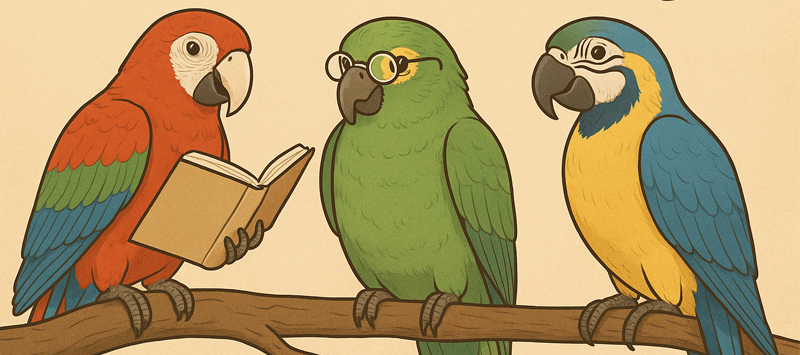
Parrots of Knowledge
 |
Sarthak Dashasahastra 24BBAE53, BBA, School of Business & Management, Kristu Jayanti (Deemed to be University) |
What makes a piece of art stand out? It could be the choice of colours, the depth of the strokes, or the complexity of the patterns—elements that are praised when they align with our perception of detail and effort. But what if that same intricacy, that same craftsmanship, was already explored by someone else? Someone who never had the means or platform to showcase it. Would the art still be considered original, or does visibility dictate authenticity?
The truth is—our admiration is rarely based on merit. It’s based on access. On exposure. And in this age, visibility can be manufactured, while substance is easily overlooked.
Then the question arises, if your knowledge is entirely borrowed or learned, if your outcomes are entirely predictable—what belongs to you?
Thinking differently is often treated like a badge of intellectual maturity. But in reality, it’s just a rerouted path toward the same conclusion. People are taught to reframe what’s already been said, to alter presentation rather than transform understanding. The vast majority of so-called “original ideas” are merely variations of earlier constructs, which happens far more commonly than you think.
But that is not even where the deeper problem lies.
Knowledge today is not growth. It is an accumulation without reflection. It is memorisation without digestion. It is a blind race to appear more intelligent, quicker, more informed — not to be any of those things, but to be seen as such. Knowledge has become a status currency, spent meaninglessly in conversations with no weight.
Everyone wants to learn only to repeat. No one learns to question. No one learns to contradict. No one learns to rebel. The very system which taught them to “think critically” also beats them down the moment they try. And so they fall in line, smarter in words, dumber in essence.
The rat race is not only a career path anymore. It is a cognitive epidemic. Students, workers, even creators—they parrot ideas they barely understand, chasing grades, chasing followers, chasing validation. They do not pursue knowledge because they are curious; they pursue knowledge because they are terrified of being left behind. In doing so, they guarantee their own intellectual death. Every generation imagines itself as more educated than the last. The truth is uglier. They are more decorated, not more educated. They are faster, but not wiser. They know where to find information, but not how to absorb it. They are flooded with facts but starved of meaning.
And worse, they do not stop at their own decay. They glorify it. They demand that others run alongside them in this stupidity, shaming those who choose slower, deeper paths. In a world where fast consumption is confused with intelligence, patience is now seen as incompetence. Silence is seen as ignorance. Reflection is seen as a weakness.
Knowledge has been reduced to noise. To impress. To defend. To pretend. No wonder real wisdom disappears quietly; it cannot survive where the loudest voice wins, and the most profound thought is mocked for being “too complicated.”
Knowledge is supposed to make you more human.
Today, it only makes you more marketable.
The true mind that seeks to know will no longer find a home among the masses. He will find himself alienated, misunderstood, and often ridiculed. However, in that isolation, he will still be closer to the truth than a million who run in circles, gasping for air they never even wanted in the first place. It’s meant to be carried, not as a burden, but as a compass.